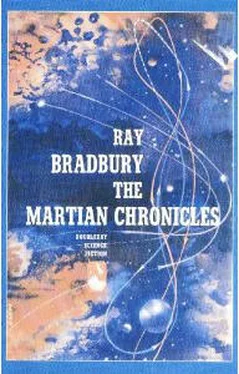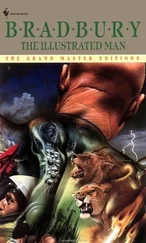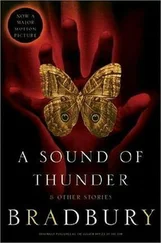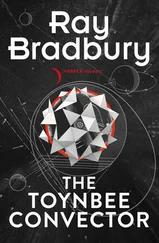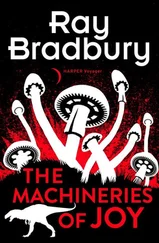And that brass band today? What a startlingly wonderful plan it would be. First, fool Lustig, then Hinkston, then gather a crowd; and all the men in the rocket, seeing mothers, aunts, uncles, sweethearts, dead ten, twenty wears ago, naturally, disregarding orders, rush out and abandon ship. What more natural? What more unsuspecting? What more simple? A man doesn’t ask too many questions when his mother is soddenly brought back to life; he’s much too happy. And here we all are tonight, in various houses, in various beds, with no weapons to protect us, and the rocket lies in the moonlight, empty. And wouldn’t it be horrible and terrifying to discover that all of this was part of some great clever plan by the Martians to divide and conquer us, and kill us? Sometime during the night, perhaps, my brother here on this bed will change form, melt, shift, and become another thing, a terrible thing, a Martian. It would be very simple for him just to turn over in bed and put a knife into my heart. And in all those other houses down the street, a dozen other brothers or fathers suddenly melting away and taking knives and doing things to the unsuspecting, sleeping men of Earth…
His hands were shaking under the covers. His body was cold. Suddenly it was not a theory. Suddenly he was very afraid.
He lifted himself in bed and listened. The night was very quiet The music had stopped. The wind had died. His brother lay sleeping beside him.
Carefully he lifted the covers, rolled them back. He slipped from bed and was walking softly across the room when his brother’s voice said, “Where are you going?”
“What?”
His brother’s voice was quite cold. “I said, where do you think you’re going?”
“For a drink of water.”
“But you’re not thirsty.”
“Yes, yes, I am.”
“No, you’re not.”
Captain John Black broke and ran across the room. He screamed. He screamed twice.
He never reached the door.
In the morning the brass band played a mournful dirge. From every house in the street came little solemn processions bearing long boxes, and along the sun-filled street, weeping, came the grandmas and mothers and sisters and brothers and uncles and fathers, walking to the churchyard, where there were new holes freshly dug and new tombstones installed. Sixteen holes in all, and sixteen tombstones.
The mayor made a little sad speech, his face sometimes looking like the mayor, sometimes looking like something else.
Mother and Father Black were there, with Brother Edward, and they cried, their faces melting now from a familiar face into something else.
Grandpa and Grandma Lustig were there, weeping, their faces shifting like wax, shimmering as all things shimmer on a hot day.
The coffins were lowered. Someone murmured about “the unexpected and sudden deaths of sixteen fine men during the night — ”
Earth pounded down on the coffin lids.
The brass band, playing “Columbia, the Gem of the Ocean,” marched and slammed back into town, and everyone took the day off.
June 2001: — AND THE MOON BE STILL AS BRIGHT
It was so cold when they first came from the rocket into the night that Spender began to gather the dry Martian wood and build a small fire. He didn’t say anything about a celebration; he merely gathered the wood, set fire to it, and watched it burn.
In the flare that lighted the thin air of this dried-up sea of Mars he looked over his shoulder and saw the rocket that had brought them all, Captain Wilder and Cheroke and Hathaway and Sam Parkhill and himself, across a silent black space of stars to land upon a dead, dreaming world.
Jeff Spender waited for the noise. He watched the other men and waited for them to jump around and shout. It would happen as soon as the numbness of being the “first” men to Mars wore off. None of them said anything, but many of them were hoping, perhaps, that the other expeditions had failed and that this, the Fourth, would be the one. They meant nothing evil by it. But they stood thinking it, nevertheless, thinking of the honor and fame, while their lungs became accustomed to the thinness of the atmosphere, which almost made you drunk if you moved too quiddy.
Gibbs walked over to the freshly ignited fire and said, “Why don’t we use the ship chemical fire instead of that wood?”
“Never mind,” said Spender, not looking up.
It wouldn’t be right, the first night on Mars, to make a loud noise, to introduce a strange, silly bright thing like a stove. It would be a kind of imported blasphemy. There’d be time for that later; time to throw condensed-milk cans in the proud Martian canals; time for copies of the New York Times to blow and caper and rustle across the lone gray Martian sea bottoms; time for banana peels and picnic papers in the fluted, delicate ruins of the old Martian valley towns. Plenty of time for that. And he gave a small inward shiver at the thought.
He fed the fire by hand, and it was like an offering to a dead giant, They had landed on an immense tomb. Here a civilization had died. It was only simple courtesy that the first night be spent quietly.
“This isn’t my idea of a celebration.” Gibbs turned to Captain Wilder. “Sir, I thought we might break out rations of gin and meat and whoop it up a bit.”
Captain Wilder looked off toward a dead city a mile away. “We’re all tired,” he said remotely, as if his whole attention was on the city and his men forgotten. “Tomorrow night, perhaps. Tonight we should be glad we got across all that space without getting a meteor in our bulkhead or having one man of us die.”
The men shifted around. There were twenty of them, holding to each other’s shoulders or adjusting their belts. Spender watched them. They were not satisfied. They had risked their lives to do a big thing. Now they wanted to be shouting drunk, firing off guns to show how wonderful they were to have kicked a hole in space and ridden a rocket all the way to Mars.
But nobody was yelling.
The captain gave a quiet order. One of the men ran into the ship and brought forth food tins which were opened and dished out without much noise. The men were beginning to talk now. The captain sat down and recounted the trip to them. They already knew it all, but it was good to hear about it, as something over and done and safely put away. They would not talk about the return trip. Someone brought that up, but they told him to keep quiet. The spoons moved in the double moonlight; the food tasted good and the wine was even better.
There was a touch of fire across the sky, and an instant later the auxiliary rocket landed beyond the camp. Spender watched as the small port opened and Hathaway, the physician-geologist — they were all men of twofold ability, to conserve space on the trip — stepped out. He walked slowly over to the captain.
“Well?” said Captain Wilder.
Hathaway gazed out at the distant cities twinkling in the starlight. After swallowing and focusing his eyes he said, “That city there, Captain, is dead and has been dead a good many thousand years. That applies to those three cities in the hills also. But that fifth city, two hundred miles over, sir — ”
“What about it?”
“People were living in it last week, sir.”
Spender got to his feet.
“Martians,” said Hathaway.
“Where are they now?”
“Dead,” said Hathaway. “I went into a house on one street. I thought that it, like the other towns and houses, had been dead for centuries. My God, there were bodies there. It was like walking in a pile of autumn leaves. Like sticks and pieces of burnt newspaper, that’s all. And fresh . They’d been dead ten days at the outside.”
“Did you check other towns? Did you see anything alive?”
Читать дальше
